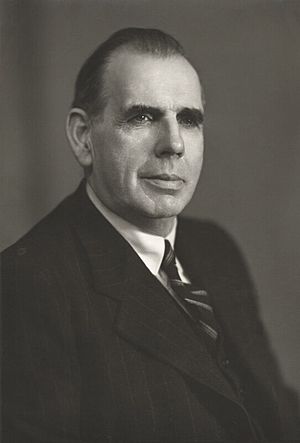Gordon Macdonald, 1st Baron Macdonald of Gwaenysgor facts for kids
Quick facts for kids
The Lord Macdonald of Gwaenysgor
|
|
|---|---|
 |
|
| Commission Governor of Newfoundland | |
| In office 1946–1949 |
|
| Preceded by | Humphrey Walwyn |
| Succeeded by | Position Abolished, Annexed into Canada |
| Personal details | |
| Born | Lord Macdonald of Gwaenysgor May 27, 1888 Gwaenysgor, near Prestatyn, Flintshire, Wales |
| Died | January 20, 1966 (aged 77) |
| Resting place | Lord Macdonald of Gwaenysgor |
| Nationality | British |
| Parent |
|
Gordon Macdonald, 1st Baron Macdonald of Gwaenysgor (born May 27, 1888 – died January 20, 1966) was an important British politician. He was a member of the Labour Party. He is best known for being the last British governor of Newfoundland. He also led the group that governed Newfoundland, called the Commission of Government. He served from 1946 until Newfoundland joined Canada in 1949.
Contents
Early Life and Education
Gordon Macdonald was born in a small place called Gwaenysgor in Wales. His family later moved to an area in England where there were many coal mines. His father worked as a coal miner.
Gordon started working in the mines when he was just 13 years old. Even though he started work early, he was very smart. He won a special scholarship to attend Ruskin College. This college helped working-class people get an education.
After his education, he became involved in his community. In 1920, he was elected to a local board that helped people in need. He also became a leader in a local group that helped miners.
Becoming a Member of Parliament
In 1929, Gordon Macdonald was elected as a Member of Parliament (MP). An MP is someone who represents their local area in the British Parliament. He represented the area of Ince.
He held this position until 1942. During his time as an MP, he also held other important roles. He worked as a junior whip for the Labour Party. He also chaired important meetings in the House of Commons. In 1942, he left Parliament to take on a new role. He became a regional controller for the Ministry of Fuel and Power. This job involved managing fuel and power resources in a large area of England and Wales.
Leading Newfoundland
In January 1946, Gordon Macdonald was given a very important job. He was made the Governor of Newfoundland. At that time, Newfoundland was not yet part of Canada. It was a British dominion, which means it was a self-governing territory under British rule.
As Governor, he was also the head of the Commission of Government. This group was in charge of governing Newfoundland. One of his main tasks was to help Newfoundland decide its future. He oversaw an election in 1946 for a group called the Newfoundland National Convention. This group discussed what Newfoundland should do next.
He also managed two important votes, called referendums, in 1948. These votes asked the people of Newfoundland if they wanted to join Canada or become an independent country again. These votes led to Newfoundland joining Canada in March 1949. It then became a province of Canada.
Gordon Macdonald left Newfoundland after it joined Canada in 1949.
Later Political Roles
When Gordon Macdonald returned to the United Kingdom in 1949, he continued his political career. He joined the government of Prime Minister Clement Attlee. He was given the role of Paymaster General. This is a government position that deals with payments and finances.
He also became a member of the House of Lords. This is the second chamber of the British Parliament. He was given the title of Baron Macdonald of Gwaenysgor. In 1950, he led the British group at an important meeting in Australia. This meeting discussed how to help countries in Southeast Asia. He also attended meetings at the United Nations General Assembly in New York. He continued in his government role until the Labour Party lost power in 1951.
Life After Politics
Even after leaving government, Gordon Macdonald remained active in public life. He was a fluent speaker of the Welsh language. From 1952 to 1960, he served as the National Governor for Wales for the British Broadcasting Corporation (BBC). This meant he helped oversee the BBC's work in Wales.
He also chaired the Broadcasting Council for Wales until his death. From 1952 to 1959, he was a member of the Colonial Development Corporation. This group helped with development projects in British colonies.
Gordon Macdonald was a religious man, belonging to the Congregational church. He was also the National President of the Band of Hope Union of Great Britain in 1951. This organization promoted a healthy lifestyle for young people. He received two special honorary degrees in law from universities in Canada and Wales.
Family Life
In 1913, Gordon Macdonald married Mary Lewis. They had two sons and one daughter.
He passed away in January 1966, at the age of 77. His oldest son, Gordon Ramsay MacDonald, took over his title as Baron.
See also
- List of people from Newfoundland and Labrador
 | Lonnie Johnson |
 | Granville Woods |
 | Lewis Howard Latimer |
 | James West |

